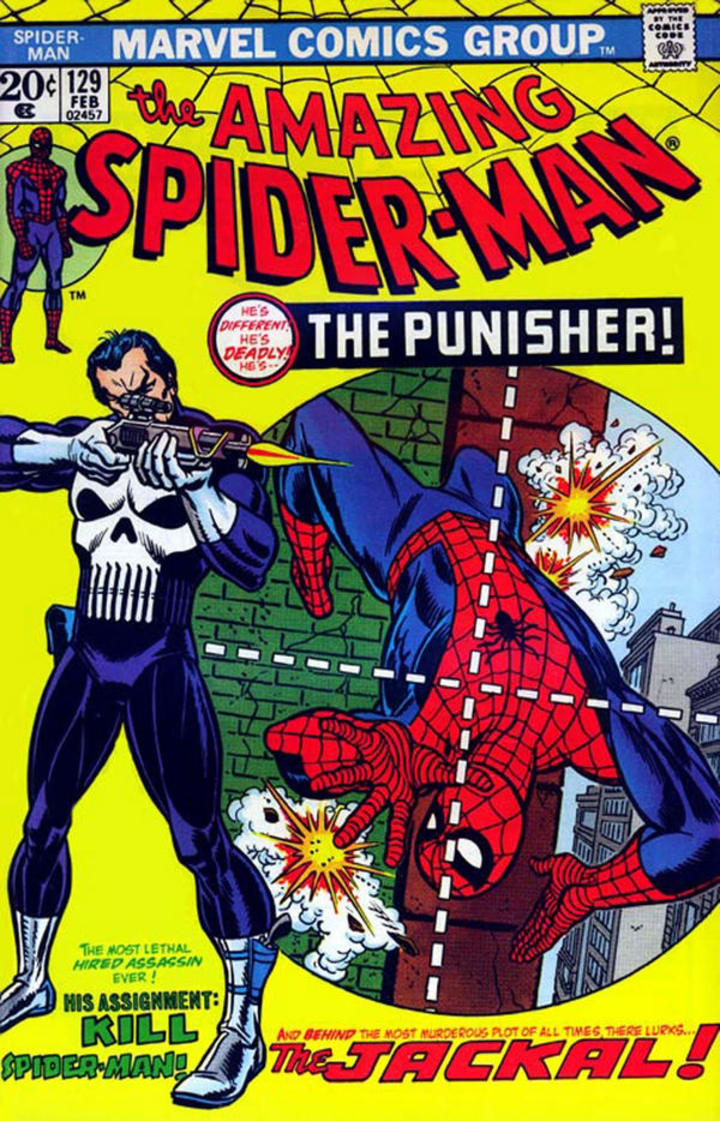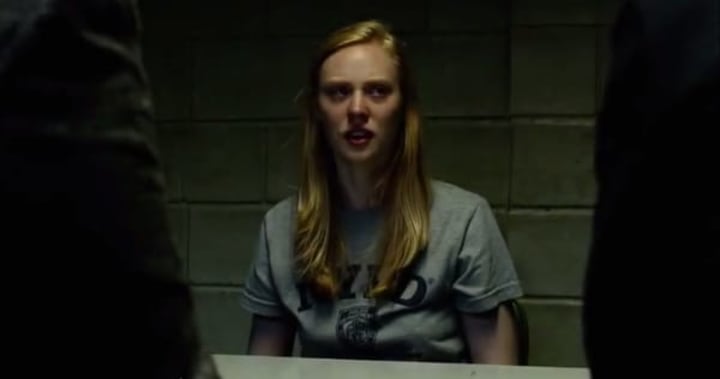
Excitement is building for The Punisher, the unexpected sixth Marvel Netflix series. Introduced in Daredevil Season 2, Jon Bernthal's Punisher was so popular that Marvel and Netflix quickly signed him up for his own show. With filming underway, fans are hopeful that the series will air as soon as next year! What few fans realize, though, is that the Punisher is actually a bit of a gamble for Marvel. Here's why...
When Is the Punisher Successful?

The Punisher's first appearance! Image: Marvel Comics
The Punisher was introduced in Amazing Spider-Man #129 — with Spider-Man in his crosshairs! At the time, Spider-Man was believed responsible for the death of Gwen Stacy (grief-stricken, he'd blamed himself for her death in front of a cop). Viewing him as a murderer, the Punisher launched a near-successful campaign against the wall-crawler.
As his creator Gerry Conway explained, that's actually the way the Punisher was always intended to be used.
"He was created to be an oppositional figure to superheroes. In a sense, he’s the worst impulse of the superhero, right? The superhero takes the law into his own hands, he sets himself up as above the law – or outside the law at the very least – so the Punisher is a madhouse mirror reflection of that."
Daredevil Season 2 is a perfect example of the Punisher as the 'oppositional figure'. The show used the Punisher as a dark reflection of Daredevil, showing what he could be if he just allowed himself to kill. The relationship between the two was fascinating; each could understand the other, but they would never agree. The Punisher was used to indicate Daredevil's basic goodness and decency as a superhero.

The Punisher and Daredevil. Image: Netflix
It's undeniable that the Punisher has had a tremendous influence in popular culture. Comic book writer Nathan Edmondson was writer of a recent (and excellent) Punisher series, and he pointed out:
"The Punisher is perhaps the most ubiquitous comic character, world-wide. Soldiers wear him on their uniforms who haven’t read a comic in their lives; sex toys are nicknamed for him, racecars and wrestlers take on the skull or namesake, despite having little awareness of the actual comic... I have always liked The Punisher, the simplicity of the uncompromising death dealer; even his costume is simple, no-nonsense, fierce."
Here's the thing, though; when you take that "uncompromising death dealer" and make him the center of your story, you're going to encounter problems. This is particularly the case if you try to make him realistic; his morality becomes disturbing, his methods become extreme, and he loses that sympathetic edge. This is why Conway calls him an "oppositional" figure; he wasn't created to stand alone. For all his ubiquity, it is the idea of the "uncompromising death dealer" that has influenced popular culture so much; when that idea is realized, and given form in TV, film, or solo comic, it fails to have the same cultural impact.

An iconic logo. Image: Marvel Comics
This is why a solo series featuring the Punisher is such a risk. As Gerry Conway observes:
"When you see him in a standalone story or – as they try to do in the movies – in a real world context, he doesn’t really work."
Why Has Marvel Taken This Risk?
The reality is, though, that popular culture has changed. Society is losing confidence in traditional law enforcement (particularly in America). Even police procedurals such as Law and Order frequently show their stars abandoning legal methods and threatening violence to coerce cooperation. Meanwhile, liberals and conservatives alike can point to countless cases where the judicial system has been seen to fail; where the 'punishment' doesn't seem to fit the crime. All of this adds up to a belief that the system is simply unfit to handle the realities of crime. Thus, the vigilante becomes attractive.
The Punisher's brutality can also be set against a political and cultural issue; to what extent should society focus on the punishment of the criminal, and to what extent should it focus on the rehabilitation of the criminal?
Before the rule of law, people took justice into their own hands; as a result, one action could cause ever-escalating feuds between families and tribes. The Old Testament attempted to limit this with the principle of 'Lex Talionis', or 'an eye for an eye'. The idea was that the punishment had to be somehow equivalent to the crime, rather than exceeding it. Nowadays, Lex Talionis itself has fallen out of fashion; instead, the criminal courts are often focused on rehabilitation. Many are unhappy with that, particularly those with more conservative leanings.

So the Punisher takes a stand. Image: Netflix
Culture has changed since 1974, when Gerry Conway created the Punisher. Set in the modern context, the idea of the Punisher is a lot more attractive; he represents a grim solution to a failed system, and to a world where the scales of justice have shifted away from punishment and towards rehabilitation. Now may well be a better time to try again with the Punisher.
How Can Marvel Mitigate the Risks?

How can this work? Image: Netflix
Marvel can reduce the risks, though — and again, the key is in Conway's description of the Punisher. He describes the Punisher as an "oppositional" figure, one who should always stand in contrast with the hero. If this is the case, then there's a simple way to ensure the Punisher Netflix series works.
Introduce an oppositional figure for the Punisher. Give him a supporting character whose morality differs to his own, who still has a belief in the system, and who continually challenges both the Punisher and the audience to consider whether or not the Punisher's methods are appropriate. Use the series to explicitly challenge these issues, rather than leaving them in the background, and perhaps even have the nerve to conclude Punisher with an ambivalent response; so that people can walk away challenged to make up their own minds on the issue, rather than being led in any particular direction by the Punisher.

Karen Page is coming! Image: Netflix
The good news is, I can already see the potential for this. We now know that one of the supporting cast in Punisher is Deborah-Ann Woll's Karen Page, and she could serve just such a purpose. Karen is hardly 'whiter-than-white' — in Daredevil Season 1 she killed one of the Kingpin's closest allies — but she still retains some trust in the system. The dynamic between Karen and the Punisher was one of the most entertaining parts of Daredevil Season 2, in part because each character shone a light on the other's issues and motivations. If Marvel continues in that direction — and uses Karen to help illuminate the issues of justice and rule of law — then this Marvel Netflix version of Punisher could be a lot more than just a glorified blood-bath. It could be a tremendous vigilante-centered action series that dares to face society with real, meaningful questions.
Marvel is taking a risk with Punisher; an "oppositional" character, he always needs to be placed in deliberate contrast against someone else, someone whose morality ensures readers and viewers are challenged with some pretty deep issues. The good news is, Marvel seem to have recognized the risk; including Karen Page as supporting cast suggests that we could get a fascinating show, one that proves yet again that popular culture can present real challenges to society.
Featured Image: Netflix
About the Creator
Tom Bacon
A prolific writer and film fan, Tom has a deep love of the superhero genre.






Comments
There are no comments for this story
Be the first to respond and start the conversation.